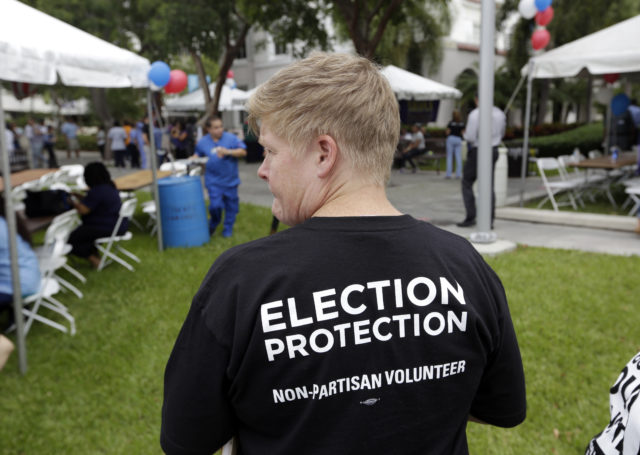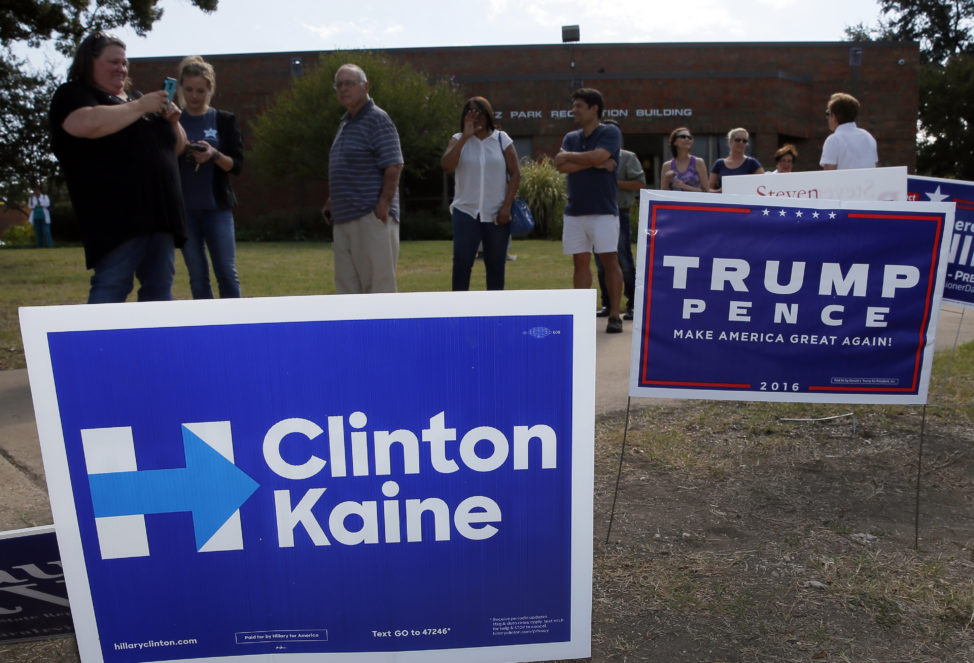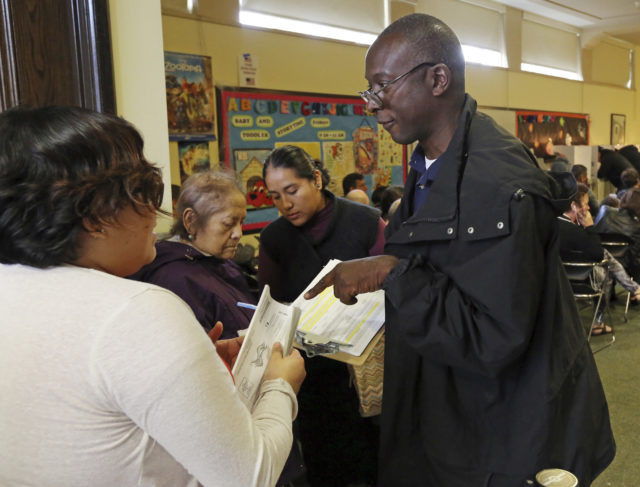Donald Trump’s claims of a rigged election has put a spotlight on the intricacies of the process of voting in the United States.

Lisa Hubbard, a volunteer with the non-partisan Election Protection Coalition, attends an early voting celebration outside of Jackson Memorial Hospital, on the first day of early voting in Miami-Dade County for the general election, Oct. 24, 2016, in Miami. The event was organized by local unions and immigrant groups to encourage people to vote during the two week early voting period. (AP)
There is no centralized governance of American elections, except the Voting Rights Act of 1965, which enforces the 15th Amendment, affirming the right to vote no matter “race, color, or previous condition of servitude.” And the 26th Amendment sets 18 as the minimum voting age.
Otherwise, it’s left up to individual states to establish its own rules for such things as registering to vote, methods of voting, and challenging voter credentials.
Republicans and Democrats will have official poll watchers deployed across the country to look for voting irregularities. But Trump has urged supporters to do so on their own to ensure the election “is not stolen” from him. Democrats are concerned that will cause voter harassment and suppression.
The rhetoric about rigging the election and suppressing the vote is adding stress to an already emotionally-chargbed campaign.
Election Fraud Is No Myth
Ed Feulner – The Washington Times
Case in point: “The Success of the Voter Fraud Myth,” a Sept. 19 New York Times editorial that staunchly maintained that allegations of voter fraud are a partisan trick to suppress votes and delegitimize the results. Actual voter fraud, the Times insists, is very rare, an all but nonexistent bogey man whipped up purely for political gain.
Tell that to Russel Withers, who owned multiple radio and TV stations in Illinois. He pleaded guilty to voting multiple times in 1998 and 2000 elections in both Colorado and Illinois. He was fined $10,000….
Voter fraud, a myth? Only if you ignore clear and mounting evidence to the contrary.
If Election Is Rigged, It Isn’t Against Trump
Jesse Jackson – Chicago Sun-Times
Poll worker Phillip George helps a voter check in at a weekend early voting polling place at the North Hollywood branch library in Los Angeles on Oct. 30, 2016. Los Angeles County election officials say some voters waited more than two hours to cast a ballot amid strong interest in early voting. (AP)
Today, money floods our politics. In Citizens United v. FEC and other decisions, a conservative gang of five on the Supreme Court legitimated corporate financing, dark money and unlimited donations. The two-party bias of our electoral system undermines third-party efforts. The lack of free media and public financing makes big money more important. Elections held on Tuesdays make voting harder for workers on the clock. This is a system rigged to protect the interests of the few from the threat of the many.
This election isn’t rigged against Trump. If anything, it is rigged in his favor. We have a separate and unequal electoral system in which each state creates its own rules. In many states, partisans have their thumb on the scale…
A Responsible Refusal From Trump
Peter Roff – U.S. News & World Report
Trump’s refusal to endorse an outcome that has not yet occurred was not just politically smart – 41 percent of people now think the election is rigged – but an honest and ethical one. All he was saying, as more than one friend of mine observed throughout the week, is he recognized he has a responsibility to make sure the election is fair and that all votes were counted and accounted for.
That means no cheating, and we should all applaud him for his courage in saying it instead of mocking him or making him out to be an Americanized version of a third world tinpot. The lie here isn’t that the system is rigged – the lie is that everyone who loses does so without for a moment questioning the outcome.

FILE – In this Oct. 27, 2016 file photo, early voters stand by campaign signs as they wait in line at a voting location in Dallas. It will be strictly a spectator sport for the estimated 46 million people who are likely to vote in advance of Election Day. Voters in Colorado, Oregon and Washington have no choice but to vote by mail. (AP Photo/Tony Gutierrez, File)
Voter Suppression Is a Much Bigger Problem than Voter Fraud
Ari Berman – The Nation
Voter fraud is a very small problem in American politics and voter impersonation, which GOP-backed voter-ID laws are meant to address, is exceedingly rare. As I’ve written over and over, you’re more likely to be struck by lightning than impersonate another voter at the polls.
The real danger to American democracy stems from GOP efforts to make it harder to vote. New voting restrictions—like voter-ID laws, cuts to early voting and barriers to voter registration—that are in place in 14 states for the first time in 2016 will make it harder for millions of eligible voters to cast a ballot. And voters are lacking crucial protections because this is the first presidential election in 50 years without the full provisions of the Voting Rights Act.


